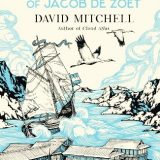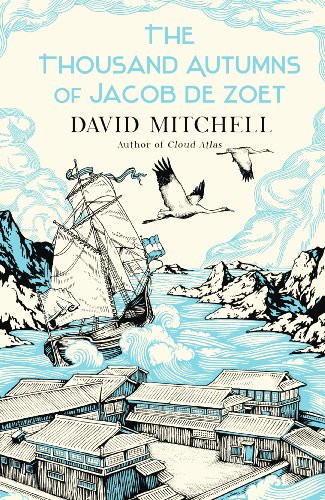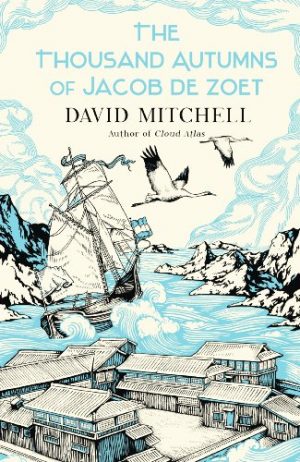The Thousand Autumns of Jacob de Zoet – David Mitchell – 2010
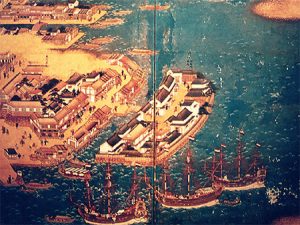
Posted by Steven on 30/10/2012, 14:07:43
Much of the novel takes place in Dejima, an artificial island in Nagasaki harbor. There is a very nice Wikipedia article on Dejima here: http://en.wikipedia.org/wiki/Dejima
One of the illustrations (below) shows a pair of Dutch merchants with Japanese courtesans, circa 1800. This could easily be a scene from the novel.
Coincidentally, I’ve read stories or novels this year that were set in Nagasaki by three Japanese authors: Ryunosuke Akutogawa, Shusaku Endo, and Ryu Murakami.
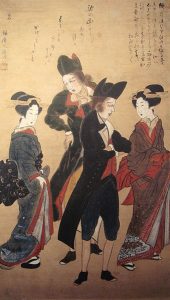
Posted by guillermo maynez on 5/11/2012, 16:17:53, in reply to “Re: The Thousand Autumns of Jacob de Zoet – NON SPOILER”
Question for American friends: Dr. Marinus says that the Yankees, that is, Americans from the North, were already in favor of the abolition of slavery. This, in 1799. Was that trend already in place in that date?
~
Posted by Steven on 5/11/2012, 18:27:48, in reply to “Re: The Thousand Autumns of Jacob de Zoet – NON SPOILER”
By 1799 most, but not all, of the Northern states had begun to abolish slavery, but in most cases by declaring that the children of slaves were free. So there were still slaves throughout the North in 1799. It was taken for granted by many in the South too that slavery would die a natural death there as well. Many slaves were being freed, and free blacks were welcome in Southern society. In both regions the decline of slavery was for economic reasons, not humanitarian ones. It was a political factor at the time, but not a seriously divisive issue.
However the invention of the cotton gin made slavery a very profitable institution, so the South, where cotton could be grown, renewed its interest in slavery, and began importing even more slaves until the slave trade was abolished by both the U.S. and Great Britain in 1808. It wasn’t until the 1820s, however, that slavery became the dominant issue in American politics. There were many reasons for this, mostly economic. The more vocal the Northern abolitionists became, the more intransigent the South became in defense of slavery, and conditions which had been improving for both slaves and freedmen began to deteriorate.
So I would say that Captain Lacy’s attitudes are, in a sense, ahead of his time. In 1799 slavery existed in most of the world, but it was widely considered to be an obsolescent institution. Most Southerners wouldn’t have been as focused on defending slavery and racial superiority as he is. I’m not saying the author has erred with the character, but I do think he reflects a stereotype from a later generation.
~
Posted by Sterling on 5/11/2012, 20:52:11, in reply to “Re: The Thousand Autumns of Jacob de Zoet – NON SPOILER”
Guillermo, Steven is certainly correct, although morally based abolitionist sentiment existed in the North from the very beginning of the US. The Pennsylvania Abolition Society was initially formed in 1775. Thomas Paine was a founding member. It was re-organized in 1784. Benjamin Franklin was a member then and attempted to bring the slavery issue to the Constitutional Convention. The New York Manumission Society was formed in 1785 by John Jay, the first Chief Justice of the United States. Alexander Hamilton was also a member. Jay drafted a state law to abolish slavery absolutely in 1777. It did not pass, and New York, like most Northern states, voted for gradual emancipation. Even slave-owning Jefferson proposed that slavery be ended in all the territories. It lost in the Congress of the Confederation by one vote.
Those who delight in pointing out that several Founding Fathers, such as Washington and Jefferson, owned slaves never concede that Founding Fathers from the North tended to be abolitionist. The split between North and South goes back before the founding of the union. It still exists today. A few hours in Alabama should be enough to convince anyone of that. So yes, in my opinion a Southerner such as Lacy might well have showed the characteristic pugnacity and angry defensiveness that has marked the American Southerner for well over 200 years.
~
Posted by Steven on 7/11/2012, 10:40:13, in reply to “Re: The Thousand Autumns of Jacob de Zoet – NON SPOILER”
This discussion of the character of the American South versus that of the North can certainly be a lead-in to one of the themes of The Thousand Autumns of Jacob de Zoet, which is national character. The Dutch, Japanese and English are all represented with different characteristics, but each portrayed sympathetically through the principal characters.
I finished the book yesterday afternoon before becoming distracted by election returns. This is definitely a novel where spoilers are an issue, so we should defer discussing the particulars until everyone has finished.
It will be interesting to compare it with Wolf Hall as they represent contrasting approaches to writing historical fiction.
~
Posted by Lale on 10/11/2012, 10:48:51, in reply to “The Thousand Autumns of Jacob de Zoet – NON SPOILER”
: Much of the novel takes place in Dejima, an artificial
: island in Nagasaki harbor. There is a very nice
: Wikipedia article on Dejima here:
: http://en.wikipedia.org/wiki/Dejima
It is interesting that at some point Dejima was almost lost among the re-claimed land and expansion of Nagasaki.
Since I read the book, I have been wanting to have an understanding of its size. I have been planning to measure the size of my step (it maybe half a meter) and then walk around my neighbourhood counting my steps and calculating to mark a portion of land that roughly comes to 120 meters by 75 meters. Then I will be able to visualize the area where these men spent years at a time.
Lale
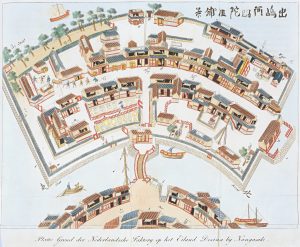
~
Posted by Steven on 10/11/2012, 11:19:28, in reply to “Dejima”
It’s easy for me to visualize because it’s slightly longer than an American football field (including the end zones) and about half as wide. Soccer fields vary in size, but at their largest they are just slightly smaller in both dimensions than Dejima.
I think being cut off from outside contact except for maybe one ship a year would be a greater hardship than the physical confinement.
~
Posted by Guillermo Maynez on 15/11/2012, 17:21:21, in reply to “Re: Dejima”
I finished TTAOJDZ last night and liked it very much. I’m ready to discuss it when everybody else is.
~
Posted by Guillermo Maynez on 17/11/2012, 10:29:45, in reply to “Re: Dejima”
The first thing I want to say about this book is that it sent me right back to the days when I read Salgari, Verne, and Dumas. It is essentially an adventure novel, and the only difference is the frank reference to body fluids and sexual encounters, which makes it more modern. Mitchell never paints a Romantic portrait of a bygone era, but crudely depicts the hardships, for example, of life on board of a vessel. Other than that, it’s a classic tale of adventure in faraway, exotic lands, with crazy, bad Lords like Enomoto, a James Bond movie-like villain.
Although I wouldn’t say this adventure has deep psychological penetration, a-la-Conrad, some characters are well created, especially, in my mind, Dr. Marinus, Ogawa Uzaemon, and Jacob himself. These three constitute, for me, the center of the story. Orito, of course, receives a lot of attention during her stay, escape, and return to the monastery, and before in the first chapter when she delivers the magistrate’s baby. She seems to have deserved Jacob’s and Uzaemon’s devotion.
The story about Enomoto’s sect eating the babies in order to stay alive forever is never developed: we never know why they came to that lucid conclusion, how it started, and what the belief was all about beyond that. But it’s bad enough to make us feel for Orito and her fellow sex slaves, and her escape and return speak volumes about her moral character.
It’s hard to accuse Jacob of adultery or infidelity when he falls for Orito: so long a time separated from home makes one yearn for some love, when there’s someone there who deserves it. Those were hard times indeed for lovers from different backgrounds.
Summing up for now: great story; magnificent work of creating a world and depicting a place and an era; interesting, fleshed-out characters; moral dilemmas enough to raise it above a mere entertainment; and some minor details which do not, in my opinion, detract from the enjoyment of the tale.
~
Posted by Steven on 17/11/2012, 13:38:46, in reply to “Re: Dejima **Spoilers**”
I agree with Guillermo’s assessment. I enjoyed The Thousand Autumns very much and learned a lot from it. While it isn’t as deep in character or theme as some literary works are, I don’t think it was intended to be. It is just everything a great work of historical fiction should be.
As I mentioned earlier, there is an interesting contrast between this work and Wolf Hall, etc., in the approach to historical fiction. Wolf Hall uses historical figures and stays within the bounds of documented events, if not motivations. The Thousand Autumns substitutes fictional characters for historical ones to give the author more freedom to invent events and personalities.
This book is something a confluence between two threads in my recent reading. I’ve read three books this year by Shusaku Endo, a Japanese Catholic from Nagasaki, one of which was about the Portuguese missionaries at Nagasaki. I also read a long story by Akutagawa Ryunosuke that dealt with the Christians at Nagasaki.
I’ve also read three books in which a black mass plays a part. Of course there is no such ceremony in our current book, but the idea of obtaining eternal life by drinking the blood of a baby or child is common to both. (Did it say they ate them? I only recall that they drank their blood, then buried the bodies.) As far as we know, the cult is a fabrication by the author, so he may have just transplanted the idea from Europe to Japan, but I wonder if there isn’t some deep seated prehistoric notion at work here.
Also, noting that the nuns all have birth defects and Orito has a burn to the face, I wonder if the author isn’t somehow referencing the atomic attack on Nagasaki yet to come? Actually as I read the book I kept expecting some mystical time portal or something as an explanation–that is until I was far enough into it to accept that it was going to be strictly historical fiction.
~
Posted by Sterling on 17/11/2012, 14:13:57, in reply to “Re: Dejima **Spoilers**”
Well, I stayed up until 2:00 AM last night to finish it, although I was nodding off a few pages from the end and had to finish today. I haven’t stayed up late to finish a novel in a very long time. As Guillermo correctly noted, it is to a great extent an adventure novel, although it is proof that such books can have high literary value.
Did anyone else think that the book was strangely structured? Part One is about Dejima with Jacob at the center. However, several other characters are allowed to tell their tales and add interest and richness to the story. Part two is almost entirely about Orito and Uzaemon. It reads almost like a thriller, albeit with a tragic end inconsistent with the conventions of the genre. Part three seems to shift more to Captain Penhaligon and the HMS Phoebus. I was at first resistant to shifting so much focus to an entirely new set of characters, but I was eventually gripped by suspense in this episode as well.
Incidentally, the Phoebus incident is based in fact. Mitchell cleverly reminds us of pf the Phoebus/Phaeton myth, perhaps to guide us to check it out. The HMS Phaeton did indeed slip into Nagasaki harbor under a Dutch flag and fired cannons and muskets at Dejima and Nagasaki. The real incident took place slightly later, 1808. Indeed, Napoleon did not invade and annex Holland until 1810. (The Napoleonic Wars had not yet gotten underway in 1800. On the other hand, apparently the Dutch East india Company expired, for the first time, in 1800.)
Anyway, I enjoyed the novel very much, and look forward to what the rest of you have to say.
~
Posted by Steven on 18/11/2012, 9:19:50, in reply to “Re: Dejima **Spoilers**”
: Did anyone else think that the book was strangely
: structured?
I wouldn’t say it was strange–we’ve read lots of other books that change point of view–but the title and initial chapters do lead you to think you will be seeing everything from Jacob’s perspective, so it’s a bit of an adjustment when that ceases to be the case.
One of the things that is often mentioned in the book is the idea of there being a “national character.” This was the era of the dawn of nationalism. The shifting POV from Dutch, to Japanese, to English emphasizes this, as do comments made about Prussians, Portuguese, and Irish. We see–to point out the negatives–the Dutch as unprincipled and acquisitive, the Japanese as cruel and inflexible, and the English as arrogant and violent.
~
Posted by Sterling on 18/11/2012, 10:09:15, in reply to “Re: Dejima **Spoilers**”
: I wouldn’t say it was strange–we’ve read lots of
: other books that change point of view–but the title
: and initial chapters do lead you to think you will be
: seeing everything from Jacob’s perspective, so it’s a
: bit of an adjustment when that ceases to be the case.
Yes, I guess that’s part of it. The first section is so mainstream/traditional in its storytelling that I was expecting the novel to continue that way. I’m not sure that this is so, but in retrospect, it seems as though there are no scenes in Part One that do not involve Jacob, at least peripherally. POV is third person limited, exclusively to Jacob (although several people are allowed to tell their own interesting stories.)
Mitchell sets up Part Two. We are, of course, wondering why Orito is desperate to enter Dejima and prevented from doing so. It is only a modest adjustment to start to follow her. At this point, Otane is the only totally new character that is sprung on us, and we rapidly connect her to the main storyline. Part Two starts shifting the POV between Otane, Orito, Uzaemon, and Jacob (and probably a few others). The story stills feels relatively tight. The developing love story between Jacob and Orito in Part One is essentially still central. In a more conventional novel, Jacob would take a more central role in her rescue, but in Japan that is, of course, impossible.
With Part Three, we open with what I think may be the only true first-person POV in the novel. We naturally wonder who this is, and then feel lost when he is no one we know. Mitchell then flings us aboard the Phoebus. We don’t know where we are, but we certainly know that this is unlikely to relate to Orito. Only at the end does Mitchell reveal how all the major plot strands tie together. Not strange compared to say, Omensetter’s Luck perhaps, but in that novel we are aware that we are in Joyce/Woolf territory from the first page.
Mitchell is famous as an experimental postmodern novelist (I’m at a loss for what to call this style). TTAOJDZ is fundamentally a piece of traditional storytelling, but I think his lack of conventionality slips through in places. Not
to mention that there are some passages of truly virtuoso prose, especially in the third part. He masterfully shows Penhaglion’s dreams, opiate deliria, and stream of consciousness breaking through his conventional third person limited POV.
And yes, the contrast of nationalities is a main theme. I also think that the relationships between parents and children, especially fathers and sons, is a prominent theme. More later.
~
Posted by guillermo maynez on 22/11/2012, 16:52:59, in reply to “Re: Dejima **Spoilers**”
Necessarily, there is a stark contrast between national characters: Dutch and Japanese cultures are very different, and they especially were in those times. It is simply shocking that an island nation was so adverse to sea-going, while the tiny Netherlands (an island-nation in many ways) were forced to take to the sea and find resources away from home. The Dutch ports were very cosmopolitan, multicultural places where the rough sailors and pragmatic bankers and insurers, as well as ambitious merchants, coexisted; while Japan, for some reason, was an ethnically homogenous (by and large), xenophobic (racist?), and inward-looking. They were also probably cleaner than the Dutch sailors and clerks. Now, spending so much time so far away from home does not necessarily erodes your culture, but it certainly relaxes some moral principles, with the notable exception of the righteous and almost prudish Zeelander Jacob. The rest of the guys, with the exception of the illustrated Dr. Marinus, were rough men with hard lives.
Just by chance, I happen to be reading Baruch Spinoza’s “Theological-political Treatise”. As you may know, he was a Dutch Jew from Spanish-Portuguese descent, writing in the 1660’s. He mentions the Japanese-Dutch Agreement as an example of political situations prevailing over religious rules (the Dutch agreeing no to perform Christian rituals while on Dejima). Strange, isn’t it? To find a reference to Dejima in a book where I didn’t expect it, and so soon!
~
Posted by Sterling on 23/11/2012, 17:08:55, in reply to “Re: Dejima **Spoilers**”
I tried to do a little research on why Japan was closed and didn’t have a navy. They were sea-going up to a point. They fished, traveled between their islands, and travelled to Korea and especially to China. None of these countries historically seems to have been particularly interested in expanding outside their borders. Korea was protected by its mountainous geography. (Japan did try to invade more than once, but was repulsed.) China was large enough to spend its history in internal conflicts. (Naval battles in China were fought on the rivers.) Historically, it does not seem to have wished to expand to Japan. It was unnecessary. Apparently, the Japanese were satisfied with their archipelago and did not wish to take on the gigantic Chinese empire. If no one starts naval battles, no one needs a navy. If you know what’s near you for thousands of miles, you have no wish to explore. You have no concept that there may be miraculous lands thousands of miles away. It may have seemed like dreaming of traveling to the moon. (Maybe. I’m speculating here.)
In the 16th century, Portuguese and Spanish traders arrived, soon bringing Jesuit missionaries with them. At first, these “barbarians” were a novelty and trade with them was interesting and lucrative. However, the missionaries were surprisingly effective. The growing population of Christians was seen as destabilizing to the shogunate. In addition, powerful families that held trading contracts with Westerners were amassing great wealth and power. Foreign technology may have been a factor as well. (Not to mention, some word of the Western habit of taking even civilized foreign nations and making them colonies may have made an impression.) I think Mitchell does a good job of emphasizing what a central part in the closing of Japan was due to Christian influence. Perhaps the Dutch won out because they were a merchant nation that was generally willing to leave their bibles (if not their psalters) at home.
~
Posted by Steven on 24/11/2012, 9:12:19, in reply to “Re: Dejima **Spoilers**”
Interesting thoughts about the history of the region. I did a bit of reading about Chinese history a couple of years ago, and it was regularly emphasized that the Chinese simply had no interest in the outside world and its products. That’s why the British in the 19th century had to create demand by getting Chinese hooked on opium from India. The English were buying vast amounts of tea from China, but selling nothing back to the Chinese, so they had the same cash flow problems that the U.S. now has. (And China, like Japan, tried to restrict foreign trade to a single port: Guangzhou (aka Canton).)
Obviously China did have some trade with Japan, as much of Japanese culture derives from China, but what’s curious is that the Japanese chose to restrict trade with China almost as rigidly as they did with Europe. There was no issue of cultural contamination here, as Chinese Buddhism was already well established.
Europe’s commercial and naval superiority may also have just been an accident of geography. They had the advantage of three enclosed seas, the Black, the Baltic, and the Mediterranean, in which to cut their teeth before venturing out in to the open ocean.
Cultural contamination seems to have remained the most common theme of Japanese literature from Natsume Soseki to the present. Of course nowadays the best example of resistance to cultural contamination is Iran, but with modern technology a country can’t just close its borders and ignore the rest of the world.
~
- Related:
- Book Reviews


